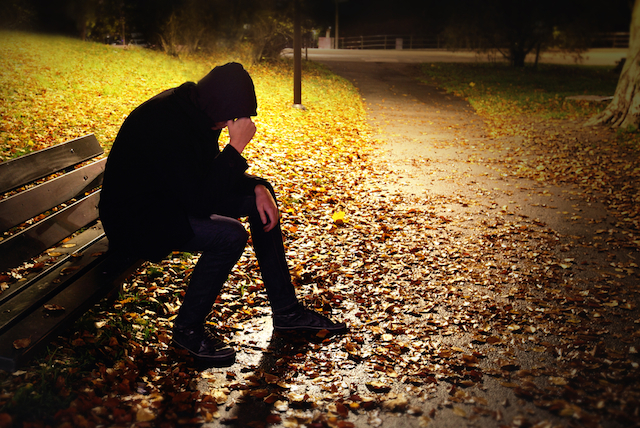
“Never apologize for showing feelings. When you do so, you apologize for the truth.” ~Benjamin Disraeli
Three years ago, at twenty-five, I had a breakdown that stole over two years of my life and almost killed me.
People often think of breakdowns like car accidents—one almighty crash that results in the dissolution of that person’s being. But for most of us, breakdowns are a slow descent into madness. They creep up on you. They change you one small step at a time until you no longer recognize yourself.
You get exhausted walking around the supermarket for your weekly shopping. You have a panic attack because you’re supposed to go out with friends but can’t face them. You’re reduced to tears because even getting dressed feels overwhelming.
I went from someone who was strong into someone I didn’t know; I existed, but I wasn’t there.
I couldn’t leave my bed, didn’t eat, and could barely even talk at times. Though I had suffered with depression since I was thirteen, I had never known pain like this. I wanted so desperately to end my life but had no energy to do so, which only added to my misery.
I felt lost, stuck, and hopeless, and believe I would never find myself again.
Though I’m still left with remnants of my breakdown, including post-traumatic stress disorder, I can appreciate the lessons it taught me, however difficult they were to learn at the time. If you’re going through hard times yourself, you may find these lessons helpful.
1. Let your friends be there for you.
The saying goes that when you are at your lowest point in life, you will discover your true friends, and I am blessed to have discovered mine. The ones who would allow me to Skype from my bed so that we could enjoy breakfast together. The ones who understood when I couldn’t face them for dinner like we had enjoyed so many times before. The ones who would say nothing, but lie on my bed and hug me when I couldn’t talk.
Friends often don’t know how to help you when you’re struggling, so you have to ask for what you need. Allowing them to be there for you in this way can really strengthen your relationship. It shows that you can count on each other when times get tough.
2. Learn to say “no.”
Instead of accepting things that were no good for me, be it other people’s negative behavior or situations that upset me, I began to say “no” and walk away.
If friendships were bringing me down instead of lifting me up, I ended them, and instead of feeling obliged to attend gatherings, I cancelled because I recognized I needed time to look after myself.
We are conditioned by society to believe that saying “no” to invitations or commitments is selfish, but when you are struggling so intensely, you need to get selfish. Learn to look after yourself in the smallest of ways and evaluate what works and doesn’t work so you can eliminate the latter.
3. Stop worrying about what others think.
Mental health (or lack of it) can be a difficult concept for others who’ve never struggled with it to understand.
If you have cancer or physical symptoms, such as a broken leg, you can explain a lot of your mood away, but when your pain is neatly wrapped up in your head and you have nothing to show for your illness, you find yourself having to justify not being able to get out of bed. So I stopped worrying about what others thought.
As long as you know your truth, nothing (and no one) else matters. While we often seek acceptance from others, if you can accept that you are not “crazy” and that you are sick, needing help, it can often take away the guilt and embarrassment you may feel.
4. Become grateful and proud for the small things.
As a healthy person, we really do take the most routine and mundane things for granted; it’s not until we can’t do them that we realize just how treasured they are.
Simple things, such as reading a book, become impossible because you can’t finish a sentence without forgetting the beginning of it. You have no energy to leave the house even when it’s sunny. You can’t bring yourself to go out to dinner with friends you’ve known for years.
When you are able to read a whole page of the book, walk to the shop for some milk, or spend an hour with a friend, be proud of yourself!
Don’t beat yourself up because you couldn’t leave the house; be proud that you managed to get out of bed, even if it was to sit on the couch. Every little thing becomes a big achievement, and one you should be proud of.
5. Listen to yourself and look after your needs first.
Being depressed made me incredibly introspective and therefore, very in tune with my body and what I craved on a daily basis. Sometimes I needed company, so a friend would visit to offer their love and comfort. On other days I needed to be alone and cry until my head hurt.
Your needs will change daily, and that’s okay. Some days you might want to go for a walk in the sun with a friend, but other days you might just want to snuggle up at home with your phone off and a good movie. You should remember that both are different ways of looking after yourself.
As Winston Churchill once said, “If you’re going through hell, keep going.” And I did. Every day I woke up (despite not always wanting to) and I survived.
My breakdown changed me in ways I couldn’t hope to put into words. Though I wouldn’t want anyone else to go through the despair that I did, I’m thankful for the painful, yet necessary, lessons it taught me, and the person it has made me become.
Depressed man image via Shutterstock
About Toni White
Toni is a writer, thinker, and traveller with a love of nature and the African continent. She attempts to turn pain into beauty through her writing in the hopes that it will comfort, help, and encourage others to live despite their troubles. She is currently writing at reclaimingyourfuture.com and can also be found on her Facebook page (facebook.com/reclaimingyourfuture).
- Web |
- More Posts













 Though I run this site, it is not mine. It's ours. It's not about me. It's about us. Your stories and your wisdom are just as meaningful as mine.
Though I run this site, it is not mine. It's ours. It's not about me. It's about us. Your stories and your wisdom are just as meaningful as mine.